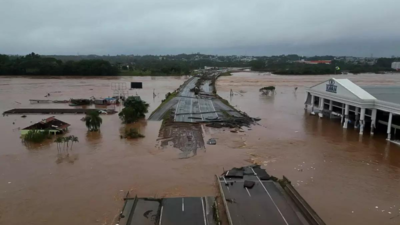Flooded Taquari river bridge, which is part of the BR-396 highway that connects the cities of Lageado and Estrela, in the region of Vale do Taquari, Rio Grande do Sul state, Brazil on May 3, 2024. (AFP)
Marty Malinow’s mom never could get her head around what her son did for a living. To friends, she said he was “a
stockbroker
that does something with the weather.” Malinow couldn’t really object – he knew most people had no clue about
financial contracts
based on things like rainfall and wind.
That’s beginning to change. Against a backdrop of rising
climate volatility
and social shifts, demand for
weather derivatives
is surging.
Average trading volumes for listed products jumped more than 260% in 2023, according to the
CME Group
, with the number of outstanding contracts currently 48% higher than a year ago. And that publicly traded corner could make up as little as 10% of all activity, according to industry estimates; outstanding derivatives may be worth as much as $25 billion based on notional value.
“There’s a lot more trajectory to our business right now,” says Malinow, the founder and chief executive officer of advisory firm Parameter Climate. “The heightened fragility from direct weather volatility, supply-chain issues, inflation, geopolitics. It means weather can eat up a bigger part of the bottom line now.”
Wall Street’s better-known weather bets, catastrophe bonds, are also riding high following a year of bumper returns. But this boom is playing out in derivatives, which provide a different kind of hedge: Protection from less severe but more common meteorological threats. While a cat bond may pay out if a 100-year storm tears through a community, a weather derivative can compensate a tourism business if there are too many rainy days, or a farmer if a hot summer stresses her crops.
Part of the jump in demand is driven by corporations newly confronting their exposure to the elements. In some cases, it’s because their operations have already been impacted, in others because they’re responding to investor and consumer pressures. In many jurisdictions, regulators are beginning to compel firms to quantify how much of a threat the weather is to their business. Most large and listed European firms are required to disclose what they see as risks and opportunities from environmental factors.


